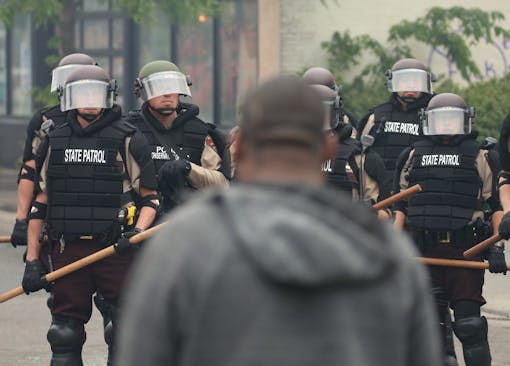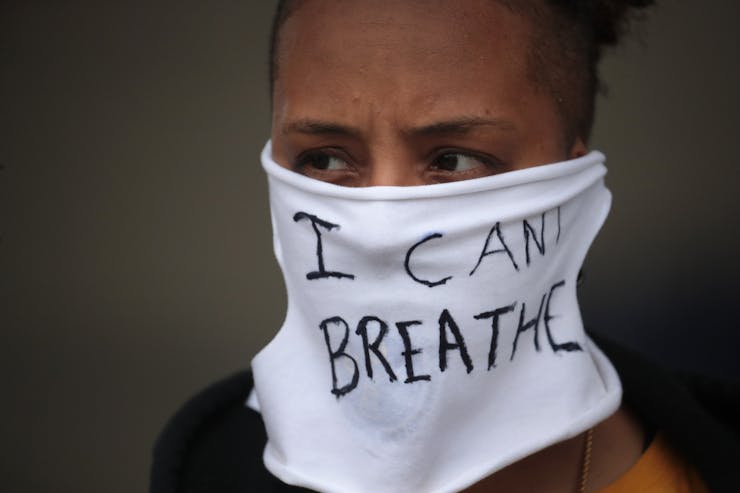‘The Haymaker’ is Leafly Senior Editor Bruce Barcott’s opinion column on cannabis politics and culture.
What began less than a week ago as a protest over the police killing of George Floyd has grown into a nationwide uprising against a racist, lawless, and unaccountable police state.
Some of us spent the weekend protesting and reporting in the streets. Others started hard conversations with friends and family. A few cleaned the wreckage of their looted businesses. Too many experienced a depressing feeling of déjà vu, having lived through every past rebellion from Watts (1965) to Ferguson (2014), only to see little lasting change.
The cannabis industry has a special responsibility because cannabis has a special history.
The murder of George Floyd forced the millions of us connected to cannabis—whether as advocates, growers, retailers, journalists, patients, or consumers—to take a hard look at our mission, our work, our achievements, our failures, and our responsibilities. That includes me, my company, and you. The war on drugs and the criminalization of marijuana are inextricably bound up in the systemic forces that have been putting the knee to the necks of Black Americans since the year 1619.

America’s war on drugs provided the mechanism for decades of Black-targeted policing and brutality. Ending it isn’t just about changing laws, though that’s a good place to start. (Photo: Long Beach, CA, May 31, 2020, by Richard Grant. Used with permission.)
Drug laws meant to target Black people
If you’re reading this, you may be a white American who, like me, has many times broken the law to enjoy marijuana. That privilege was given to us by an American legal system stacked in our favor.
'Did we know we were lying about the drugs? Of course we did.'
Where marijuana is illegal, cops use it as a pretext to stop and harass Black people. Or kill them. Meanwhile, white consumers often get a free pass. Nationwide, Black people are four times more likely to be arrested for cannabis than white people—even though usage rates are roughly equal.
That wasn’t an unintended consequence. It was the very purpose of our national and state drug laws. The war on drugs has always been a war on people, specifically Black people.

Protesters hold signs as they gather outside the White House in Washington, DC, on May 29, 2020 in a demonstration over the death of George Floyd. (Photo by Nicholas Kamm/AFP via Getty Images)
They knew what they were doing
The architects of these policies were no innocents. John Ehrlichman, President Nixon’s aide who literally started the drug war in 1971, notoriously confessed in 1999 that “We knew we couldn’t make it illegal to be either against the [Vietnam] war or black, but by getting the public to associate the hippies with marijuana and the blacks with heroin, and then criminalizing both heavily, we could disrupt those communities. We could arrest their leaders, raid their homes, break up their meetings, and vilify them night after night on the evening news. Did we know we were lying about the drugs? Of course we did.”
In the past decade, cannabis and social justice advocates have forced sweeping historic change by legalizing marijuana, state by state. That accomplishment is profound. It cannot be sullied or denied. Millions of Americans now enjoy cannabis responsibly and without fear of arrest or murder.
Legalization: what we learned
But in the aftermath of legalization, I and many others learned that the cords of historic injustice can’t always be cleanly cut.
Early cannabis regulations meant to keep drug cartels out of the legal industry also excluded Black people who’d been unfairly swept up in the drug war.
In the aftermath of legalization, we learned the cords of racism can't always be cleanly cut.
Later, equity programs that granted licenses to people in areas disproportionately affected by the drug war revealed a deeper truth hidden to most white Americans: People with darker skin do not enjoy equal access to capital. Small business loans aren’t available to any cannabis companies—because of federal prohibition—but white entrepreneurs often have the social connections and cultural privilege to curry favor with venture capitalists.
White families have accrued wealth at a rate 10 times that of Black families, chiefly due to the systemicdenial of home mortgages to African-Americans. In an industry where startups must rely on private investment, second mortgages, and small loans from family members, that’s a show stopper.

The white racist ‘fear’ of Black men, unarmed and peaceful, have become a license for police officers to murder with impunity. (Photo by Scott Olson/Getty Images)
Why it’s on us
Over the years I’ve heard a number of white cannabis entrepreneurs wonder why the legal marijuana industry should carry a special responsibility to build equity, fairness, and social justice into its culture and legal framework. Other businesses are free to play in the markets of capitalism without regard to ‘fairness.’ Why aren’t we?
The answer is simple. Cannabis has a special responsibility because cannabis has a special history. American laws constructed around this product put millions of Black people in jail, denied them jobs and housing, and stripped them of their right to vote. To pretend otherwise is to perpetuate America’s 400-year crime.

More than 650,000 marijuana arrests still happen across the United States every year. Black Americans are four times more likely to be arrested for cannabis than white Americans. (FOTOKITA/iStock)
So what can we do?
Over the weekend I made a list of five action areas. Please feel free to suggest more in the comments section at the end of this article.
- Support and donate money to organizations working for positive change. Help groups up and down the food chain, from the global to the local. Here’s a starting list:
- The Drug Policy Alliance: This national drug reform organization has always put people, communities, and harm reduction at the forefront of their advocacy.
- Minorities for Medical Marijuana: Rosalind McCarthy’s group has grown from a one-woman project to a national effort. They do excellent work.
- The Hood Incubator: This Oakland-based business startup support center works with people of color in the cannabis industry.
- Minority Cannabis Business Association: This business league works to improve the cannabis industry by increasing diversity.
- Black Lives Matter: It’s not just a slogan, it’s a nonprofit organization dedicated to ending white supremacy and violence inflicted on Black communities.
- The Last Prisoner Project: This nonprofit focuses on cannabis prisoner release, record expungement, and post-carceral reentry programs
- National Expungement Week: It’s Sept. 19-26 this year. Contact them to see how you can support or create an event in your town.
- The Loveland Foundation: This relatively new nonprofit provides therapy support to Black women and girls
- Community bail funds: This link lists many crowdsourced funds dedicated to helping protestors arrested in this past week’s actions. This tweet contains QR codes for easy scan-and-donate action.
- Legalize, legalize, legalize. Rip up the net that entraps Black Americans. Despite the expansion of legalization, more than 650,000 Americans are still arrested every year on marijuana charges, mostly for low-level possession. Volunteer on a local cannabis legalization campaign, or donate money. Four states (Arizona, Mississippi, New Jersey, and South Dakota) will have legalization measures on the ballot in November 2020, and advocates in four other states (Montana, Nebraska, North Dakota, Ohio) are still fighting to get petition signatures. Help them.
- Repair the damage. Work to expunge past cannabis convictions, which can severely hamper the ability of people to obtain jobs, housing, student loans, access to government programs, and the right to vote. The nonprofit group Code for America has a project called Clear My Record that develops software allowing cities and counties to automatically expunge the marijuana convictions of thousands of people at a time. They’re one of many groups working on the issue. Also an option: If you’re in a position to hire, take the proactive step of recruiting and hiring people who were formerly incarcerated.
- Don’t just vote. Be an activist voter. Fight for the right to vote, and to vote by mail, which is under siege right now. Research your local Congress member’s voting record on marijuana and justice reform measures, show up at community forums, and ask hard questions about their policies. If you find yourself at a town hall meeting with Joe Biden, tell him why he must support full legalization and not merely decriminalization. Go hyper-local: Get involved in your city or county’s district attorney or prosecutor election. Demand to know what city council candidates will do to reform police unions and restructure contracts that allow cops to skirt any and all accountability for their actions, up to and including murder.
- Improve yourself. Widen your boundaries. Learn what it means to be anti-racist; it’s not the same as being non-racist. Look into the history of wealth and housing policy in America. Understand where the term “red-lining” comes from. Readbooks that make you uncomfortable. Open your mind. Urge your friends and family to do the same.

The rise of a private prison industry has made mass incarceration profitable, fueling America’s school-to-prison pipeline. (Photo by David McNew/Getty Images)
Change begins in the mind
There is no easy fix here, but there is a simple three-step process that I like to keep in mind: Open minds, turn votes, change laws.
We see this dynamic play out every day in the cannabis world. I was reminded of it over the weekend when my mind returned to a small change-making moment many years ago.
It started with Michelle Alexander, who was at the time a lawyer for the ACLU in San Francisco. On her way to work she passed a flyer stapled to a telephone pole that declared, “The Drug War Is the New Jim Crow.”
She later recalled:
“Some radical group was holding a community meeting about police brutality, the new three-strikes law in California, and the expansion of America’s prison system… I sighed, and muttered to myself something like, ‘Yeah, the criminal justice system is racist in many ways, but it really doesn’t help to make such an absurd comparison. People will just think you’re crazy.’”
The more she looked into the war on drugs, though, the more she realized the truth of the statement. It led her to write The New Jim Crow: Mass Incarceration in the Age of Colorblindness, which has become to social justice what Rachel Carson’s Silent Spring was to the environmental movement.

The increasing militarization of police departments has helped turn public servants into ‘warriors’ occupying their own country. (Photo by Chandan Khanna/AFP via Getty Images)
Evolving beliefs based on new information
Alexander’s book became one of many pieces of new information in the early 2010s that changed my own mind about marijuana, the war on drugs, and the role of the police in American society. This past weekend I received additional information about police unions, white supremacy, police militarization, qualified immunity, and city budgets. I’ve adjusted my beliefs accordingly and will be acting on that data.
Moments like these come to each of us like strangers knocking on the front door at odd hours. You, like me, may have heard that knock over the weekend. I’m here to urge you to open the door.





